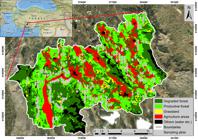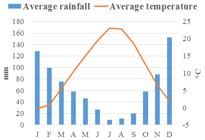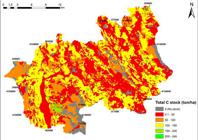| Group of Species |
Soil Carbon (ton.ha-1) |
References |
|
Pinus nigra
|
71.6 |
Kantarcı (1979a); Eruz (1984ERUZ, E. The relationships between some edaphic and physiographic features with the height development of pure larch stands in Balıkesir Forestry Directorate. İstanbul University, Publication No: 3244, Matbaa Teknisyenleri Basımevi. İstanbul, (in Turkish), 1984.); Sevgi (2003SEVGI, O. Altitudinal nutrition growth relations of black pine (Pinus nigra Arnold) at Bayramiç Forest Enterprise (Kaz mountains). Istanbul University, PhD thesis. (XV+221 pages), (in Turkish), 2003.); Özkan (2003ÖZKAN, K. Properties and classification of sites on Beyşehir Watershed. Istanbul University, PhD thesis. (XVI+189 pages), (in Turkish), 2003.); Çelik (2006ÇELIK, N. Site characteristics and classification on Sündiken Mountains. Master thesis. Istanbul University, (in Turkish), 2006.) |
|
Abies cilicica
|
82.6 |
Özkan (2003ÖZKAN, K. Properties and classification of sites on Beyşehir Watershed. Istanbul University, PhD thesis. (XVI+189 pages), (in Turkish), 2003.) |
|
Cedrus libani
|
85.7 |
Özkan (2003ÖZKAN, K. Properties and classification of sites on Beyşehir Watershed. Istanbul University, PhD thesis. (XVI+189 pages), (in Turkish), 2003.); Başaran et al. (2008BAŞARAN, M.A.; BAŞARAN, S.; KAÇAR, S.; BAŞ, N.; TOLUNAY, D.; MAKINECI, E.; KAVGACI, A.T.; DENIZ, İ.G. Determining the actual state of research forest Elmali cedar by GIS based digital maps. T.C. Çevre ve Orman Bakanlığı tarafından desteklenen (ARA 6) 19.6302/2001-2007 no.lu proje, (in Turkish), 2008.) |
|
Juniperus sp. |
64.4 |
Özkan (2003ÖZKAN, K. Properties and classification of sites on Beyşehir Watershed. Istanbul University, PhD thesis. (XVI+189 pages), (in Turkish), 2003.); Çelik (2006ÇELIK, N. Site characteristics and classification on Sündiken Mountains. Master thesis. Istanbul University, (in Turkish), 2006.); Başaran et al. (2008BAŞARAN, M.A.; BAŞARAN, S.; KAÇAR, S.; BAŞ, N.; TOLUNAY, D.; MAKINECI, E.; KAVGACI, A.T.; DENIZ, İ.G. Determining the actual state of research forest Elmali cedar by GIS based digital maps. T.C. Çevre ve Orman Bakanlığı tarafından desteklenen (ARA 6) 19.6302/2001-2007 no.lu proje, (in Turkish), 2008.) |
|
Quercus spp. |
82.3 |
Kantarcı (1974)KANTARCI, M.D. Changes in some features of forest soil by transforming the forest into pastures and fields around a forest village in Thrace. Istanbul University, Journal of the Faculty of Forestry. Series A, v.14, n.1, p.191-217, (in Turkish), 1974.; Özhan (1977ÖZHAN, S. Change of hydrologically important properties of dead covering according to some local factors in Belgrad forest Ortadere basin. Istanbul University Press . Publication No. 2330, İstanbul, (in Turkish), 1977.); Kantarcı (1979a)KANTARCI, M.D. Analytical investigation of the horizons of the soils and silicates of soils under mild climatic conditions. Istanbul University, Journal of the Faculty of Forestry . Series A, v.29, n.1, p.14-53, (in Turkish), 1979a.; Kantarcı (1983)KANTARCI, M.D. Effects of Soil Preparation and Soil Processing on Soil Properties and Development of Coastal Pine Saplings. Istanbul University, Journal of the Faculty of Forestry , Serie A, v.33, n.22:104-140, (in Turkish), 1983.; Karaöz (1988KARAÖZ, M.Ö. Comparison of the important edaphic properties of some coniferous and broadleaf forest ecosystems in terms of biomass characteristics in Belgrad Forest. İstanbul University, PhD thesis. (VII+203 pages), (in Turkish), 1988.); Sevgi (1993SEVGI, O. Properties of soil which is under the forest and clear cutter areas in the forest at granite land of Demirköy. Istanbul University, Master thesis. (VIII+83 pages), (in Turkish), 1993.); Makineci (1999)MAKINECI, E. The effects of the conversion of coppice treatments on nitrogen alteration of forest floor and soil in research forest of İstanbul University forestry faculty. 1999 Istanbul University, PhD thesis. (XXIV+213 pages), (in Turkish), 1999.; Kara (2002)KARA, Ö. Seasonal changes of the soil microfungi in the pure stands of beech, oak and pine at the mountainous site of Northern Thrace. Istanbul University, PhD thesis, XII+140 pages, (in Turkish), 2002.; Özkan (2003ÖZKAN, K. Properties and classification of sites on Beyşehir Watershed. Istanbul University, PhD thesis. (XVI+189 pages), (in Turkish), 2003.); Çelik (2006ÇELIK, N. Site characteristics and classification on Sündiken Mountains. Master thesis. Istanbul University, (in Turkish), 2006.); Başaran et al. (2008BAŞARAN, M.A.; BAŞARAN, S.; KAÇAR, S.; BAŞ, N.; TOLUNAY, D.; MAKINECI, E.; KAVGACI, A.T.; DENIZ, İ.G. Determining the actual state of research forest Elmali cedar by GIS based digital maps. T.C. Çevre ve Orman Bakanlığı tarafından desteklenen (ARA 6) 19.6302/2001-2007 no.lu proje, (in Turkish), 2008.) |
|
Cedrus libani-Juniperus sp. |
71.5 |
Özkan (2003ÖZKAN, K. Properties and classification of sites on Beyşehir Watershed. Istanbul University, PhD thesis. (XVI+189 pages), (in Turkish), 2003.); Başaran et al. (2008BAŞARAN, M.A.; BAŞARAN, S.; KAÇAR, S.; BAŞ, N.; TOLUNAY, D.; MAKINECI, E.; KAVGACI, A.T.; DENIZ, İ.G. Determining the actual state of research forest Elmali cedar by GIS based digital maps. T.C. Çevre ve Orman Bakanlığı tarafından desteklenen (ARA 6) 19.6302/2001-2007 no.lu proje, (in Turkish), 2008.) |
|
Abies cilicica-Juniperus sp. |
92.8 |
Özkan (2003ÖZKAN, K. Properties and classification of sites on Beyşehir Watershed. Istanbul University, PhD thesis. (XVI+189 pages), (in Turkish), 2003.) |
|
Cedrus libani-Pinus nigra
|
50.8 |
˝ ˝ |
|
Abies cilicica-Pinus nigra
|
62.9 |
˝ ˝ |
|
Pinus nigra-Juniperus sp. |
40.5 |
Özkan (2003ÖZKAN, K. Properties and classification of sites on Beyşehir Watershed. Istanbul University, PhD thesis. (XVI+189 pages), (in Turkish), 2003.); Çelik (2006ÇELIK, N. Site characteristics and classification on Sündiken Mountains. Master thesis. Istanbul University, (in Turkish), 2006.) |
|
Pinus nigra-Quercus spp. |
52.6 |
˝ ˝ |
|
Quercus spp.-Juniperus sp. |
44.7 |
˝ ˝ |
| Degraded forest |
79.6 |
Tolunay and Çömez (2008TOLUNAY, D.; ÇÖMEZ, A. Amounts of Organic Carbon Stored in Forest Floor and Soil in Turkey. National Symposium on Air Pollution and Control. Proceedings Books. 22-25 Ekim 2008, Hatay. 750-765, (in Turkish), 2008.) |
| Grassland |
37.1 |
Dinç (2017) |
| Cropland |
29.7 |
Shah et al. (2015SHAH, S.; IQBAL, J.; AHMAD, A.; KHAN, A. Soil organic carbon stock estimation in range lands Kumrat Dir Kohistan KPK Pakistan. Journal of Ecology and the Natural Environment. Vol 7 (11), pp. 277-288, 2015.) |

 Thumbnail
Thumbnail
 Thumbnail
Thumbnail
 Thumbnail
Thumbnail
 Thumbnail
Thumbnail
 Thumbnail
Thumbnail




